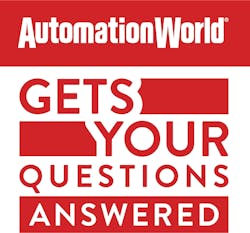TRANSCRIPT
David Greenfield, Automation World
Welcome to the Automation World Gets Your Questions Answered podcast where we connect with industry experts to get the answers you need about industrial automation technologies. I'm David Greenfield editor in chief at Automation World and the question will be answering in this episode is: What is a smart factory? And joining me to answer this question is Heather Cykoski, senior vice president of industrial and process automation at Schneider Electric. So, thanks for joining me today Heather.
Heather Cykoski, Schneider Electric
David, thank you it's such a pleasure.
David Greenfield, Automation World
So, the term smart factory is a broad concept and the definition tends to change a bit depending on whom you're talking to. So, what constitutes a smart factory from your point of view?
Heather Cykoski, Schneider Electric
So, from my point of view, first of all I'd love the word smart factory and when we define it, a smart factory is where innovation and sustainability really meet to provide an end to end digital transformation. So when we think about that it's around operational efficiency and the overall energy consumption reduction. So, it's those two areas that we're really looking to drive change. An example that I like to give a lot is what we call is drinking our own champagne. At Schneider Electric we live and breathe the same solutions that we provide for our clients for ourselves, so we've implemented smart factories at many of our manufacturing facilities around the world. Here in the US the one that I like to call out is in Lexington, Kentucky. It's a 60 year old factory that we've completely transformed with Schneider Electric’s IT solutions and that's by providing all of our latest digital tools. We've included augmented reality, we have remote monitoring and we also provide predictive maintenance. And with all of that we're driving energy efficiency, cost savings and we're also increasing not only the agility but the resiliency within the operation.
David Greenfield, Automation World
I’m glad you mentioned digital transformation in your answer there, Heather. You know, from my point of view covering industry, digital transformation seems to be a necessary component of becoming a smart factory. Do you see it that way as well or is digital transformation a separate component?
Heather Cykoski, Schneider Electric
Digital transformation is critical and the way that Schneider Electric has been approaching digital is in an approach that if we think about embedding sensors and the digital aspects of everything that we provide so that all of our technology is, in effect, digitally enabled. But it's adding that additional layer of software so then give you full visibility of your assets by taking all of their data—doing predictive analysis and getting a better understanding of your operations—and then making sure that you're making the right decision for your operations.
David Greenfield, Automation World
So, what's the status of smart factories in the US today and by that I mean: Are the numbers rapidly increasing or is this more of a slow evolution across industry?
Heather Cykoski, Schneider Electric
Across industry we see the trend towards smart factories rapidly increasing. And I'm always so impressed whether I'm in Schneider Electric’s own assets or customers to start to see that transformation first hand. What I think is more important is that when we look back years ago compared to where we're at today, even the words sustainability and decarbonization weren't in all of our vernaculars. If we look at buildings alone, they contribute to 37% of our global carbon emissions and 50% of the existing buildings will still still be here in 2050, so this is a critical area. These trends are causing us to increase this adoption. And there's a much bigger emphasis on operational efficiency and costs which is where we see more people are creating a greater demand for that connectivity.
David Greenfield, Automation World
Are there any specific drivers that you see that are making this transition to smart factories take place more quickly now or are there certain things in industry that are causing that or is it more of a slow evolution?
Heather Cykoski, Schneider Electric
I see two things: #1 is the workforce and having the amount of people available for production that's required. We've got significant demand that's here but I also think that it's important for us to constantly look at two important areas and that's people and security. So if we look at people, you know, not only are we finding recruitment of younger work workers but also the training of the older generations of workers to find the right training for our existing workforce without sacrificing major production and incurring downtimes. We have to bring people along with us to have the technologies that help make this next generation of workers successful. And then the other piece is just that the need for data safety and security. Cyber, as we all know, is absolutely key and we've been building in AI and security on all of our technologies and tools. A lot of our customers want to protect their IP—their crown jewels if you will—and it's giving them the insights to their operations. So, I'd say that probably one of the biggest missions that we're solving is with software-defined automation to create this environment where you can pull the data from all the assets of your own facility—or even across the industry—in a secure way to help push the boundaries of technology
David Greenfield, Automation World
Though I asked about smart factory evolution here in the US, obviously Schneider Electric is a global company. So do you see the issues being the same across the world that you're seeing in terms of smart factory development or are there any specific issues with it here in the US with those drivers that you mentioned.
Heather Cykoski, Schneider Electric
It's definitely something that is global and I think about our own facility whether it's in Monterrey, Mexico or in Kentucky. We’re seeing a lot of the same demands and requirements across Europe and other parts of the world also. A lot of the customers that we're working with are seeing some of the same challenges and issues.
David Greenfield, Automation World
Thanks for clarifying that, Heather. You know I was wondering if maybe Europe had more of a head start on this with the Industry 4.0 initiatives that have been going on for some time now, but it's good to hear that it's pretty equal across the world now with movement towards smart factories. Now, I know that Schneider Electric has done a lot of promotion about its own smart factory operations—like in Kentucky as you mentioned—but of course the company has a lot of automation resources readily available to it. So how does Schneider Electric’s example translate for the average manufacturer?
Heather Cykoski, Schneider Electric
Schneider Electric has done a lot of promotions just as you said. We know the importance of smart solutions for manufacturing because we use them ourselves as we were talking about. We have our Ecostruxure Automation Expert which is implementing the Internet of Things and we're using it throughout our global supply chain. We see it in smart factories and smart distribution centers in how we've reduced energy costs between 10 and 30%. We see a lot of our customers as well driving maintenance costs down between 30 to 50%. Smart factory operations is important for all of us.
David Greenfield, Automation World
In Schneider Electric's work with manufacturers of all types, what do you see as the biggest obstacles to their ability to become smart factories?
Heather Cykoski, Schneider Electric
Like we were saying before—a recruitment of young workers and training the older generation of workers trying to find the right training paths without sacrificing production downtime or increased labor costs. We also see with this rapid advancement of technologies the ease of access for smaller manufacturing businesses. We also see safety and security concerns, just as we were talking about earlier.
David Greenfield, Automation World
So, last question Heather. Can you provide an example of a manufacturing company Schneider Electric is working with to help them become a smart factory?
Heather Cykoski, Schneider Electric
Nestle is one I think we all are very familiar with—and we are big chocolate consumers in this house. They have really addressed it when they look at eliminating power disruptions and how they can reduce costs associated with maintenance within their factories. They're also responsible for 60% of the company’s coffee production and so we've been working with them closely to deliver the reliability and predictive maintenance that they need because they're really looking for a lower total cost of ownership. And the main result that we found is the remote monitoring that they've implemented allows for predictive maintenance—they have better visibility into their power usage and there have been driving the future proofing of scalability for their assets.
David Greenfield, Automation World
Thanks for joining me for this podcast, Heather. And thanks, of course, to all our listeners. Please keep watching this space for more installments of Automation World Gets Your Questions Answered and remember you can find us online at automationworld.com to stay on top of the latest industrial automation technology insights trends and news.

Leaders relevant to this content:



